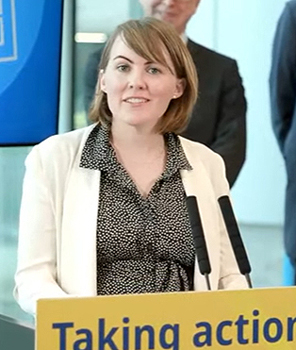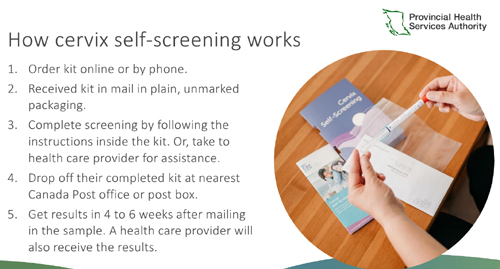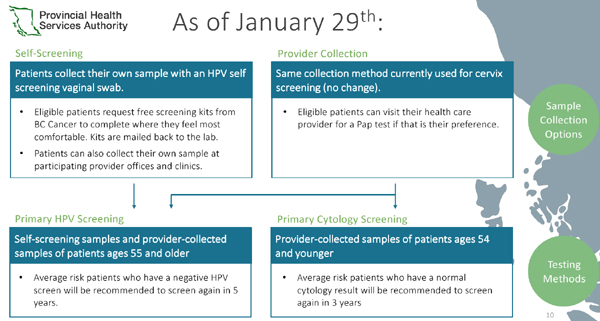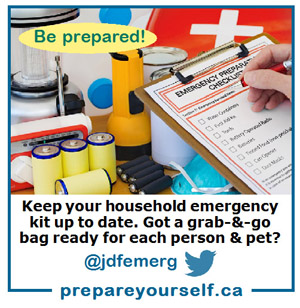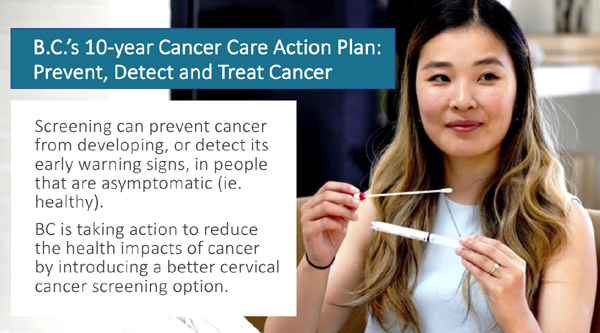
Tuesday January 9, 2024 | VANCOUVER, BC [Updated 12: 45 pm]
by Mary P Brooke, B.Sc. | Island Social Trends
A shift in the process of screening for cervical cancer will likely open up testing to more women in BC.
The program of self-testing for HPV at home or without a visit to a primary care location is intended to increase the number of opportunities for women to get tested for cervical cancer.
There will be a net increase of $12 million in costs to the BC health care system but the long-term health benefits (including early detection) are being considered well worth it.
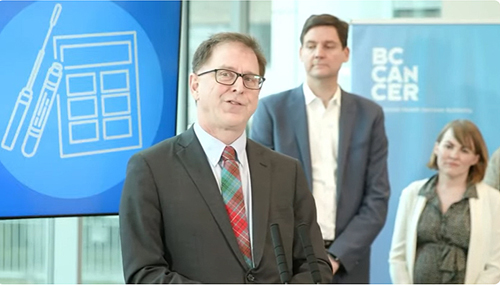
The at-home process may have the further unintended benefit of ultimately connecting more British Columbians with either a family doctor or nurse practitioner.
Only a positive test result would activate a connection between the person who took the test and a health care provider. The followup appointment would only be to discuss the at-home test results and does not necessarily imply further access to that health care professional, but it does offer the opportunity for further health care system integration for people who presently don’t have a family doctor.
Evidently, a record number of new family doctors and nurse practitioners came into the BC health care system in 2023.
The program is the first of its kind in Canada. It was already in the works in 2021 but now is also touted as likely to be helpful with the increasing health care system load due to a rapid population increase as seen over the past few years.
Announcement in Vancouver:
Today in Vancouver Premier David Eby along with Health Minister Adrian Dix made the announcement about HPV self-testing.
Also at the podium were Dr Cailey Lynch (wife of the premier, who updated about her pregnancy), and other doctors including Dr Gina Ogilvie of the UBC School of Population and Public Health.
See full BC Health January 9, 2024 news release: New Self Screening Program will help detect cervical cancer sooner.
Stable test process:
The at-home kits were tested in a pilot program in four areas of the province (central Vancouver Island, Sunshine Coast, Pemberton, and the Lower Mainland).
The pilot included considerations for environmental conditions like extremely low and very high temperatures. Stability of the test results was seen for a period of four weeks.
The mail-back postage-paid envelopes that contain a person’s completed test sample will apparently fit into “a regular post box” (presumably also the thin slots available for mail deposit in community mailboxes).
The test results from mailed-in vaginal swabs are considered to be highly reliable, with a very low score for false negatives.
Who should do the test:
Anyone who has not had a Pap test in the last three years or an HPV test in the last five years should screen for cervical cancer.
Cervix screening is recommended for women age 25 to 69.
The testing is recommended for anyone who has ever had sexual contact.
What is HPV:
HPV infection can go undetected.
HPV (human papillomavirus) is spread through intimate skin-to-skin contact. Anyone who has any kind of sexual activity with another person involving oral, genital, or anal contact can get HPV. Sexual intercourse is not necessary to get infected.
According to Immunize BC, since the infection often has no signs or symptoms, it’s not always possible to tell if someone or their partner has been infected.
About three out of four unimmunized sexually active people will get HPV at some point in their lives, says Immunize BC. HPV infection is most common in people in their late teens and early 20s.
Accessing the test:
Starting January 29, 2024 the HPV vaginal swab test can be requested from BC Cancer online or by phone by women age 25 to 69. Kits are provided at no charge.
A kit can be requested directly from the cervix-screening program by phone at 1-877-702-6566 or online at https://www.bccancer.bc.ca/screening/cervix .
Once the sample is collected by the person at home, the completed kit can be mailed in a postage-paid envelope (as provided) so that analysis can then be done. Results are ready within four to six weeks.
Who is eligible:
All women age 25 to 69 may request the free at-home HPV cervical cancer screening kits.
As well, people will receive a letter in the mail if they are due to screen based on previous medical appointments.
The test is only for non-symptomatic women. Anyone with symptoms of HPV or other pelvic conditions should seek in-person health care.
People must be registered with the Medical Services Plan.
Age-determinant testing:
Cervix screening is recommended for women age 25 to 69.
Women over age 55 will have their test results (either from at-home or by a health care provider) processed for HPV only (not for the liquid-based cytology that is done from samples obtained during a Pap test). A negative result in women over 55 years means they can wait another five years before being tested.
For women age 54 years and younger, all provider-obtained test results (through in-person Pap testing) will still be lab-tested by the standard cytology.
This age split at 55 is presumptive of sexual activity level, i.e. people over 55 are considered to be have less exposure to HPV and/or have not already shown symptoms by that age.
Cervical cancer is considered preventable through immunization and screening.
If test results are positive:
Results are provided within four to six weeks.
A positive high-risk HPV results doesn’t mean that someone has cancer, but further investigation is needed.
Possible outcomes of HPV-based screening results:
- Negative result – screen again in 5 years
- Positive for HPV types 16/18 – go for a colposcopy
- Positive for HPV types “other” – go for a followup Pap test
Benefits of HPV testing:
The pilot project that began in 2021 led to more people being screened and detecting cancer, said Health Minister Adrian Dix today. Dix says that cervical cancer could now be eliminated within 10 years as pre-cancer incidences will be found.
HPV testing looks for high-risk types of HPV. The benefits are considered to be:
- Less frequent testing. Screening can shift to every five years because the new approach has higher sensitivity and higher negative predictive value.
- People have more autonomy over testing approach because the sample is connected from the vagina or cervix.
- Reduces barriers to screening because new approach does not require a health care provider. A sample can be collected individually at home (self screening).
10-Year action plan:
The new testing process is part of BC’s 10-year Cancer Care Action Plan to prevent, detect and treat cancer.
Incidence of cervical cancer:
In BC, cervical cancer statistics:
- 200 people will get cervical cancer, and 50 will die from the disease.
- 6,000 people will develop high-risk changes to the cervix, which are precancerous.
- Over 450,000 people will undergo Pap tests, and over 14,000 will need further follow-up. Follow-up may include more Pap tests and other procedures to stop cancer of the cervix from developing.
- 110 people will get anal cancer, and 20 will die from the disease
- 5,500 people will develop genital warts.

===== RELATED:
Intensified focus on eliminating cervical cancer in BC (February 24, 2023)
NEWS SECTIONS: HEALTH




